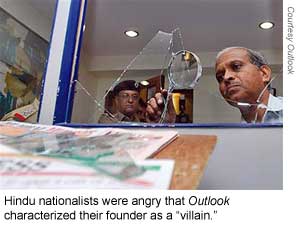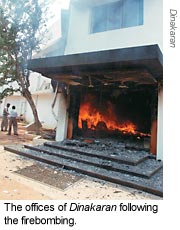Attacks on the Press 2007: India
INDIA The famously freewheeling press in the world’s biggest democracy operated largely without interference from the central government but nevertheless faced significant challenges, from the threat of violent assault to legal harassment. The dangers confronting journalists varied tremendously across regions, with those working in conflict areas or outside the major urban centers at greatest risk.…
NDTV bureau attacked, employee beaten
JANUARY 19, 2008 Posted February 1, 2008 NDTV ATTACKED NDTV offices were vandalized and a staff member beaten by Hindu nationalist activists after the channel asked viewers to evaluate controversial painter M.F. Husein as a possible candidate for a prestigious national award in an text message opinion poll, according to NDTV photographer Anamitra Chakladar and…
Journalists attacked at legislator’s home
November 1, 2007 Posted November 2, 2007 Prakash Singh, NDTV Habab Ali, NDTV Ajay Kumar, ANI ATTACKED Prakash Singh and at least two other journalists were assaulted in the central eastern state of Bihar, according to NDTV camera operator Anamitra Chakladar and local news reports.
CPJ dismayed by contempt of court ruling in India
New York, September 24, 2007—The Committee to Protect Journalists is dismayed by the New Delhi High Court’s decision last week to sentence four journalists to four months in prison apiece on contempt of court charges stemming from a series of articles and a political cartoon accusing a former chief justice of official misconduct. The journalists…

Leading Indian newsweekly attacked by hardliners
New York, August 14, 2007—The Committee to Protect Journalists condemns the attack today on the Mumbai office of the Indian weekly Outlook by a group of men who identified themselves as members of the Shiv Sena, a Hindu nationalist party. The assailants were apparently angered by the political journal’s depiction of their founder, Bal Thackeray,…
Journalists in Manipur threatened on all sides
New York, August 8, 2007—The Committee to Protect Journalists is alarmed by deteriorating conditions for the media in the northeastern Indian state of Manipur, where more than a dozen insurgent groups are involved in separatist activity or factional fighting. In addition to increased pressure from competing militant groups, journalists are now faced with a new…

CPJ calls for justice after attack kills three in the Indian state of Tamil Nadu
New York, May 11, 2007—The Committee to Protect Journalists mourns the deaths of three employees of the Tamil-language daily Dinakaran who were killed in an attack on the newspaper’s offices in the eastern Indian state of Tamil Nadu on Wednesday. “We are horrified by the attack on Dinakaran newspaper and mourn these three deaths,” said…
Indian government shutters Burmese exile-run news Web site
New York, April 17, 2007—After the forced closure of the New Delhi-based Mizzima News, an exile-run Web site popular for hard-hitting reports on neighboring Burma’s military-run government, the Committee to Protect Journalists calls on Indian authorities to fully explain the move. Approximately 20 Indian police and two municipal officials raided Mizzima’s offices on Monday and…
Government ban on Web sites draws concern
Your Excellency, The Committee to Protect Journalists is troubled by the government’s recent order to ban certain Web sites, an action that has resulted in blocked access to domains hosting many thousands of Web logs. We urge you to lift the ban, which has disrupted the flow of news, information, and commentary in a medium of growing importance in India. We are concerned as well that the order was imposed with no official explanation and without judicial or independent review.